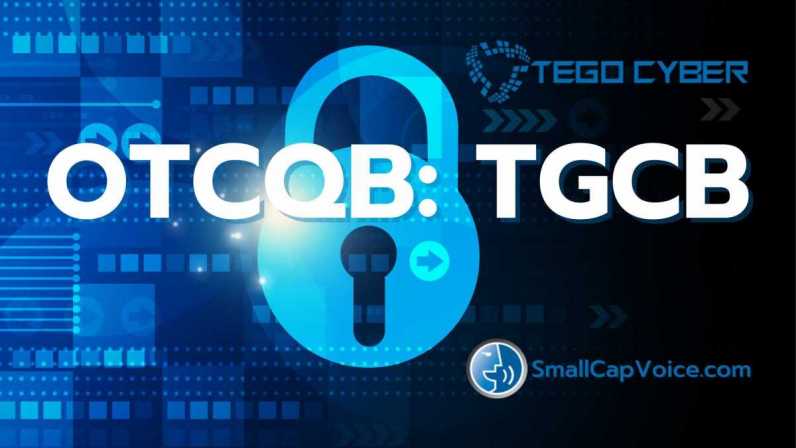
Tego Cyber Inc. (OTCQB:TGCB, “the Company”) was created to capitalize on the emerging cyber threat intelligence market. The Company has developed a cyber threat intelligence application that integrates with top end security platforms to gather, analyze, then proactively identify threats to an enterprise network. The Tego Threat Intelligence Platform (TTIP) takes in vetted and curated threat data and after utilizing a proprietary process, the platform compiles, analyzes, and then delivers that data to an enterprise network in a format that is timely, informative, and relevant. The threat data provides additional context including specific details needed to identify and counteract threats so that security teams can spend less time searching for disparate information. The first version of the TTIP will integrate with the widely accepted SPLUNK platform to provide real-time threat intelligence to macro enterprises using the SPLUNK architecture. The Company plans on developing future versions of the TTIP for integration with other established SIEM systems and platforms including: Elastic, IBM QRadar, AT&T Cybersecurity, Exabeam, and Google Chronical. For more information, please visit www.tegocyber.com.
CYBER CRIME BY THE NUMBERS (2020)
- 39 seconds – Average time between cyberattacks (Clark School / University of Maryland)
- 2,244 – Average daily hack count (Clark School / University of Maryland)
- 146 billion – Projected number of records cyber criminals will steal over next 5 years (Juniper Research)
- 300% – Percentage increase in reported cybercrimes since the start of COVID-19 (FBI)
- 206 days – Average length it took to identify a security breach (IBM)
- 7.27% – Average drop in share price for public companies that experience a breach (Comparitech)
- $4.6 Million – Average cyberattack recovery cost for organizations with $1+ billion in revenue (Radware)
The Challenge
Cybersecurity issues are now a day-to-day struggle for businesses of any size. Recent cybersecurity statistics reveal a startling increase in hacked and breached data from sources that are common in the virtual workplace such as laptops, tablet computers, mobile and IoT devices. Digital risk protection is both a technical and business issue. It is a technical issue because any type of digital device can be accessed and attacked. This is becoming a major security challenge because companies have limited experience with the virtual workplace and may not be doing enough in terms of securing personal customer and/or private corporate information. Security breaches have increased 11% since 2018 and 67% since 2014 (Accenture). In terms of overall cyberthreats, a Juniper Research report on cybercrime from 2019 suggests that the cost of malicious attacks will rise to $5 trillion by 2024. To successfully defend against cyberattacks, it is necessary for an enterprise to adopt a comprehensive cybersecurity awareness, prevention, and security plan as a part of their corporate culture.
Global Cybersecurity Market
Cybersecurity now dominates the priorities of every organization as it adapts to a post-COVID-19 world. Cyber attackers are quick to attack new unprotected threat surfaces created when tens of millions of employees started working from home and, as a result, cybersecurity is now as critical as internet access itself. As a result, the global cybersecurity market is rapidly expanding. Projections have this market growing at a compound annual growth rate of 8% from $173 billion in 2020 to $270 billion by 2026.
Cyber Threat Intelligence Market
The Threat Intelligence market segment of the global cybersecurity market is presently estimated to be in excess of $5.1 billion and is projected to grow at 19.7%, or twice the rate the general cybersecurity market-reaching $12.53 billion by 2026. Cyber threat intelligence is information an enterprise uses to understand and identify potential cyber threats that have, will, or are currently targeting that organization. This information is used to prepare for, prevent, and identify cyber threats. Cyber threat intelligence sources include open-source feeds, social media, human interaction, technical data and intelligence from the dark web. Threat intelligence solutions are designed to gather this raw data from a variety of sources and then analyze the information to produce threat intelligence reports that can be fed into automated security control solutions.
Tego Threat Intelligence Platform
Tego is positioning itself to capitalize on the growth of the cyber threat intelligence market through the development and deployment of its Tego Threat Intelligence Platform (TTIP). TTIP takes in vetted and curated threat data and using a proprietary process, compiles, analyzes, deduplicates, and contextually delivers that data to the end user in a format that is timely, informative, and relevant. It takes the analysis of the cyber-threat intelligence one step further by providing additional context including specific details needed to identify and counteract any threat, thereby significantly reducing time spent searching disparate information. The TTIP provides telemetry, or the aggregate data points that provide a complete picture of threat actor activity on the client’s networks through its integration to existing cybersecurity tools employed by the enterprise. The TTIP also increases observability and helps the client identify activity within their networks through intuitive dashboards. The TTIP is designed to seamlessly integrate with existing leading cybersecurity platforms.
The TTIP Advantage
What makes the TTIP different from other threat intelligence application currently in the marketplace is that the TTIP provides an end user’s cybersecurity team with a detailed ‘who, what, when and where’ of the threat. Other applications currently on the market may simply notify the end user that something is ‘bad’ but do not provide any additional information. It is then up to the client’s cybersecurity team to analyze the threat data to establish which threats need to be acted upon and which are lower priority. This process takes a significant amount of time and capital.
The First Integration
The first version of the TTIP will integrate with the widely used Splunk® SIEM (Security Information and Event Management) platform. At present, Splunk® has 15,000+ customers and is adding 450+ new enterprise clients per quarter. Splunk® is trusted by Fortune 100 companies including Porsche, Airbus, AFLAC, Hyatt, Zillow, Intel, Dominos, TransUnion and CenturyLink. The TTIP will be available to Splunk® users for direct download on Splunk®‘s Splunkbase. Splunkbase is a community marketplace hosted by Splunk® where users can go to find apps and add-ons for its existing Splunk® environment which can improve the functionality and usefulness of Splunk® as well as provide a quick and easy interface for specific use-cases and/or vendor products.
Revenue Streams
Tego expects to generate the majority of its revenue from licensing the TTIP. End users will be able to download the first version of the application from Splunkbase, and then are required to pay an annual license fee to activate. The annual fee for an enterprise customer is $75,000 per license per year, which offers tremendous value considering the untold costs of a successful cyber-attack. Other revenue streams include resale of gathered cyber threat intelligence data, upgraded support services and tailored cybersecurity solutions.
Sales & Marketing Strategy
The initial sales strategy will focus on existing clients using the SPLUNK® SIEM platform. The goal is to retain 3.33% of Splunk®’s existing 15,000 clients within the first three years of launching the SPLUNK® SIEM integration. Tego seeks to achieve this through a dedicated inside sales team and strategic third-party channel partners. Inside sales teams will be specifically trained to market the TTIP to Fortune 500 enterprises using the SPLUNK® SIEM platform. Tego will also actively interact with the Splunk® online community to spread the word about the uniqueness of the product.
Future Integrations
Once the initial integration with the Splunk® SIEM is complete and commercially launched, Tego will develop and launch versions of the TTIP for integration with other leading security platforms and SIEMs including but not limited to: Elastic, IBM QRadar, AT&T Cybersecurity (formerly AlienVault), Exabeam and Google Chronical.
“Our application has been designed to specifically address the void that current applications are not fulfilling, thereby adding significant value to existing security platforms,” stated Shannon Wilkinson, CEO of Tego Cyber Inc. “We are very confident that our application will quickly be recognized and find acceptance within the global security community.”

